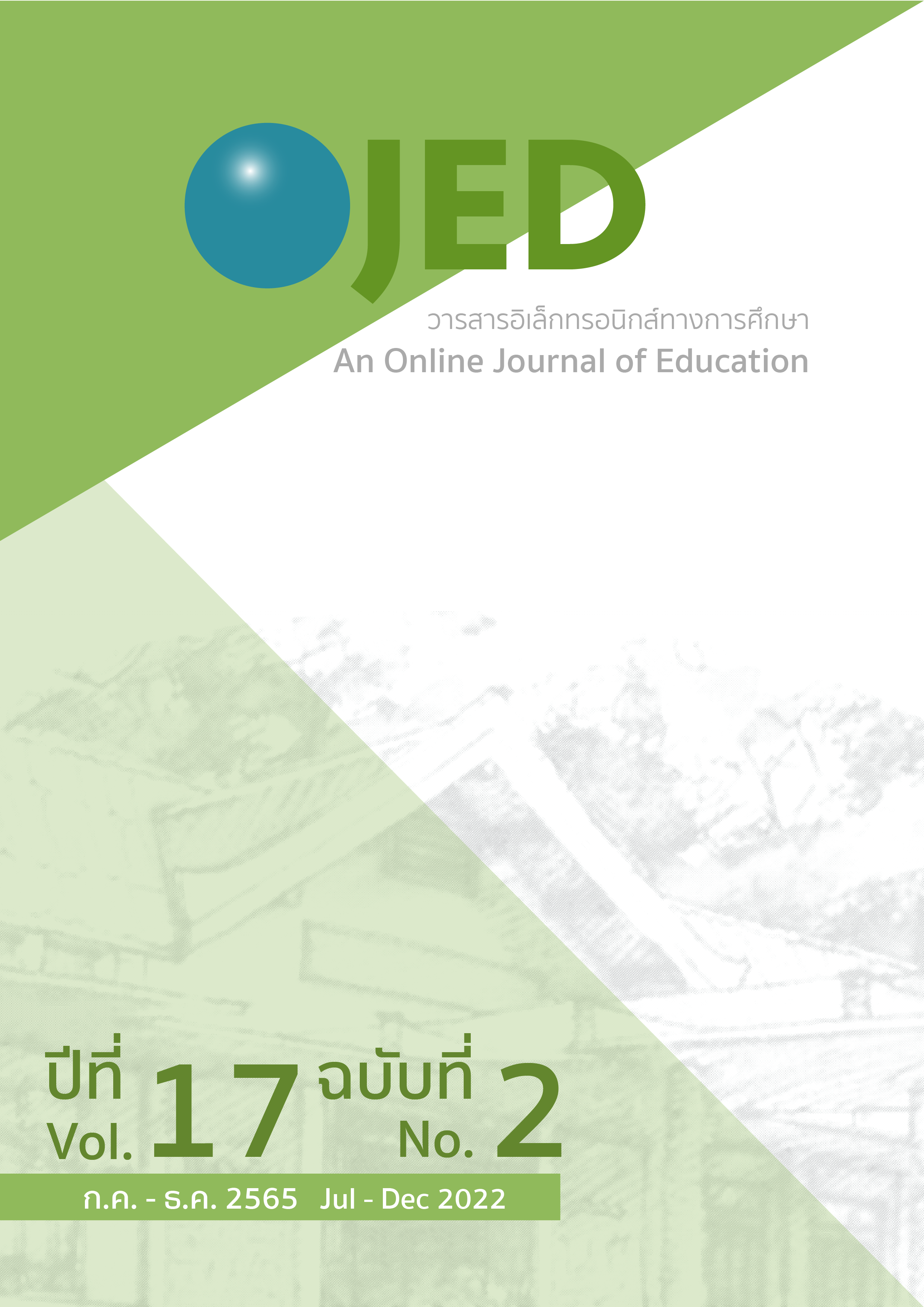Attitudes of Science Teachers toward the use of Participatory Action Research to Solve Problems in an Online Classroom
DOI:
https://doi.org/10.14456/ojed.2022.56Keywords:
online classroom, participatory action research, science classroom, solving problem in the online classroomAbstract
This research aimed to analyze science teachers’ attitudes toward using participatory action research (PAR) along with what caused the teachers to accept and use PAR to solve problems in online classrooms. In the first phase, a 5-rating scale questionnaire about solutions to classroom problems was given to science teachers. The sample included 156 high school science teachers in Thailand obtained through simple random sampling. The instrument underwent quality tests in terms of content validity, reliability, and discrimination, and the results from quality tests used to improve the instrument. In the second phase, 10 selected participants with different backgrounds from the respondents’ questionnaires were interviewed. Descriptive statistics and content analysis were used to analyze the qualitative and quantitative data. The results show that science teachers’ attitudes on using PAR in terms of the intention aspect had a high level of agreement (M = 4.46, SD = 0.53), while the facilitating conditions aspect had the highest level of agreement (M = 4.62, SD = 0.47), and performance expectancy, effort expectancy of PAR use, and social influence in using PAR had a high level of agreement (M = 4.48, SD = 0.54 and M = 4.09, SD = 0.58 and M = 4.13, SD = 0.73), respectively. The interview data shows that teachers intended to use PAR to solve classroom problems since they believed that using PAR will be an effective and clear process, depending on the collaboration of colleagues and a school working system that supports the use of PAR.
References
พีรวัฒน์ เพชรสุริยา, เก็ตถวา บุญปราการ, และ จุฑารัตน์ คชรัตน์. (2563). สภาพและปัญหาการเรียนรู้ใน รายวิชาวิทยาศาสตร์ ของนักเรียนชั้นมัธยมศึกษาปีที่1 สังกัด สพม. เขต16 สงขลา. การประชุม หาดใหญ่วิชาการระดับชาติและนานาชาติ ครั้งที่ 11. สงขลา, ประเทศไทย.
Baum, F., MacDougall, C., & Smith, D. (2006). Participatory action research. J Epidemiol Community Health, 60(10), 854-857. https://doi.org/10.1136/jech.2004.028662
Eilks, I. & Ralle, B. (2002). Participatory Action Research in chemical education. Research in Chemical Education, 98.
Flicker, S., Maley, O., Ridgley, A., Biscope, S., Lombardo, C., & Skinner, H. A. (2008).
e-PAR. Action Research, 6(3), 285-303. https://doi.org/10.1177/1476750307083711
Galletta, A., & Torre, M. E. (2019). Participatory Action Research in Education. In Oxford Research Encyclopedia of Education. https://doi.org/10.1093/acrefore/9780190264093.013.557
Halliday, A. J., Kern, M. L., Garrett, D. K., & Turnbull, D. A. (2018). The student voice in well-being: a case study of participatory action research in positive education. Educational Action Research, 27(2), 173-196. https://doi.org/10.1080/09650792.2018.1436079
Laudonia, I., Mamlok-Naaman, R., Abels, S., & Eilks, I.. (2018). Action research in science education – an analytical review of the literature. Educational Action Research, 26(3), 480–495. https://doi.org/10.1080/09650792.2017.1358198
Miedijensky, S., & Sasson, I.. (2020). Participatory action research as a way to innovate mathematics and science teaching, teachers’ professional development perceptions and performances. Educational Action Research, 1–22. https://doi.org/10.1080/09650792.2020.1802320
Salamounova, Z., & Fucík, P. (2019). The relationship between peer status and students’ participation in classroom discourse. Educational Studies, 1-18. https://doi.org/10.1080/03055698.2019.1706042
Tan, P. J. B. (2013). Applying the UTAUT to Understand Factors Affecting the Use of English E-Learning Websites in Taiwan. SAGE Open, 3(4), 215824401350383. https://doi.org/10.1177/2158244013503837
Venkatesh, V., Morris, M. G., Davis, G. B., & Davis, F. D. (2003). User acceptance of information technology: Toward a unified view. MIS quarterly, 425-478.
Downloads
Published
How to Cite
Issue
Section
License
Copyright (c) 2022 An Online Journal of Education

This work is licensed under a Creative Commons Attribution-NonCommercial-NoDerivatives 4.0 International License.




